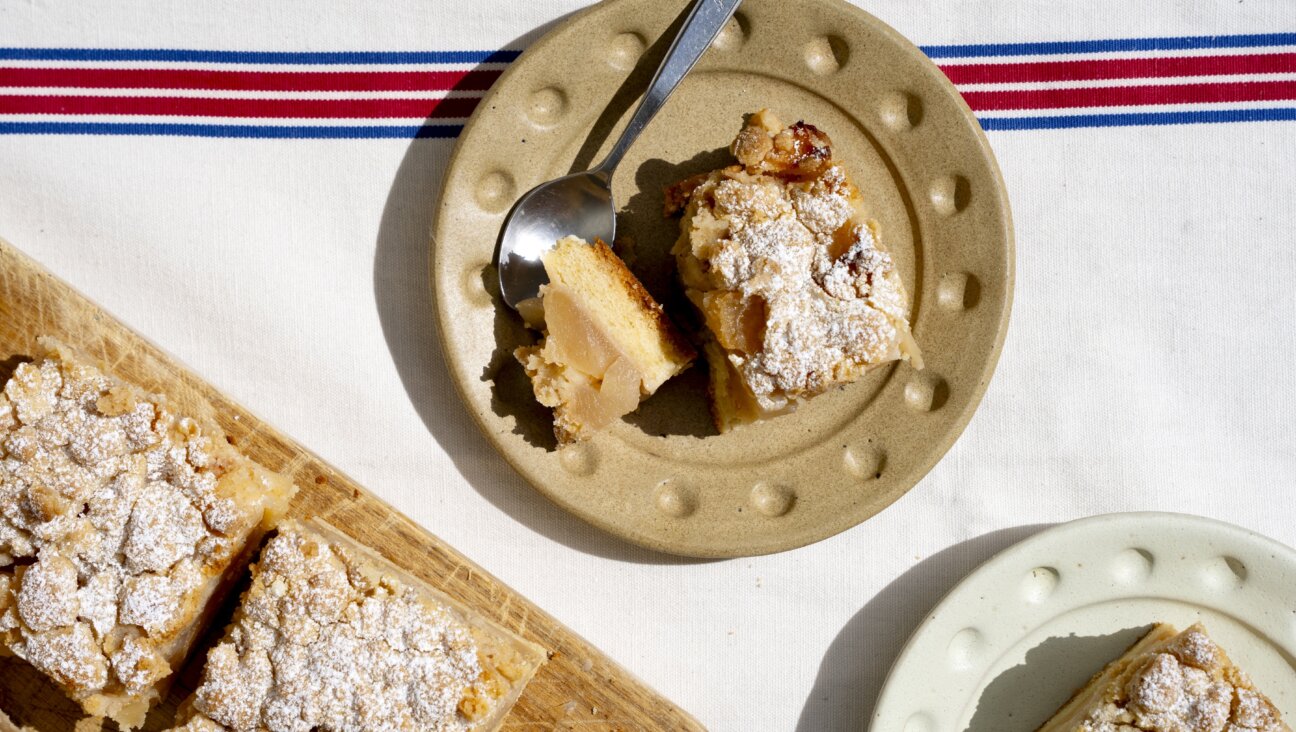Spring On A Plate: Poached Salmon With Minted Fava Mash

Image by Katherine Martinelli
I was in New York last week so I know firsthand what sort of spring the east coast has had. I was more than happy to shed my winter wardrobe and return to the balmy warmth of Israel, where spring has fully sprung. Since the growing seasons here tend to be a bit ahead of the States, I have a preview of what will be hitting American farmer’s markets any day now: artichokes, fava beans, asparagus, and the like.
I wanted to make a Shabbat meal that would celebrate springtime, a promise of what’s to come for those still shivering and seeking comfort food. So I came up with a light, healthy, clean meal bursting with the flavors of the season that can be served warm, room temperature, or even made ahead and served cold. The entire menu is parve and gluten free, so it can accommodate a variety of diets.
There are few things healthier than simple poached fish, nor easier to make. It takes about 3 minutes of prep and 5 minutes of cooking and you have perfectly cooked fish. Firm-fleshed salmon is an excellent choice for this cooking method, but halibut or cod would also work well.
For the sides, there are few flavor combinations that scream spring as much as peas and mint. While we do get peas in Israel, fresh fava beans are cause for far more excitement around here so I combine peas, favas, and fresh mint in a rough mash that would make an excellent addition to any springtime meal. You could also always keep the peas and favas whole and just toss them with mint and oil, or for a smooth puree throw everything in the food processor. The flavor is light, bright, and full of sunshine (if that’s possible). And green — very green.
It’s also fresh garlic season in Israel, which is my favorite time of year. I buy pounds of bulbs, trim the green stalks, and set them out to dry to be enjoyed for many months to come. Although fresh garlic season isn’t popular in the States, I wanted to honor it by incorporating the allium in a few ways.
I made a garlic confit so that the tender cloves and resulting flavored oil could be incorporated into both the mash and the steamed asparagus dishes. I also fried thinly sliced pieces of garlic until lightly browned and crispy to top the asparagus.
Individually, each dish is delicious and full of fresh flavor, and they can be mixed and matched with any number of other recipes. But together they produce an elegant meal with a certain harmony of flavors that is simply a perfect tribute to spring.
Serve with a medium-bodied white wine like gruner veltliner or an Israeli viognier. For dessert, a citrus sorbet would be lovely.
Poached Salmon with Minted Fava-Pea Mash and Asparagus
Serves 4
Garlic Confit and Oil
1 head garlic, preferably fresh, peeled
1-2 cups olive oil (enough to cover garlic in a small pot)
1) Put the garlic in a small pot and pour in olive oil until it just covers the garlic (the amount needed will depend on the size of your pot). Put over low heat and bring to a very light simmer (be careful not to boil the olive oil or burn the garlic).
2) Simmer, uncovered, for 20 to 30 minutes, until the garlic is very tender. Remove from the heat and cool.
3) Use immediately or store in an air-tight container in the fridge for up to 1 week. (You can also use much more garlic and save some to use in pastas, quiches, salads, and more throughout the week.)
Minted Fava-Pea Mash
2 cups shelled fava beans (from about 2 pounds whole pods)*
2 cups shelled peas (from about 1½ pounds whole pods, depending on variety)
½ cup finely chopped fresh mint
2 cloves garlic confit (recipe above)
2 tablespoons garlic oil (from garlic confit, recipe above)
Salt
1) Bring a large pot of water to a gentle boil. Add the fava beans and cook, stirring occasionally, for 3 minutes. Add the peas and continue to cook for another 2 to 3 minutes.
2) Drain and immediately rinse under cold water (this helps them stay vibrant green). Once cool enough to handle, sift through and slip off the skins from the fava beans (the white outsides of the shelled beans are edible but quite fibrous).
3) Put the fava beans, peas, mint, garlic confit, and oil in a large bowl and mash with a masher until you’ve reached the desired consistency. If you prefer a smooth puree you can put all the ingredients in a food processor.
4) Season with salt and serve or set aside.
*You can substitute frozen shelled fava beans and/or peas, just run them under cool water for a few minutes first to defrost slightly. Shelled edamame would make a nice substitute as well.
Asparagus with Garlic Two Ways
1 bunch asparagus (about 10 ounces)
2 tablespoons olive oil
4 cloves garlic, thinly sliced
Garlic confit (recipe above)
Coarse salt
1) Fill a large pot with water and bring to a boil. Add the asparagus and cook for 3 to 5 minutes, until tender.
2) Drain and rinse under very cold water. Dry and transfer to a serving plate.
3) Heat the olive oil in a small skillet and add the garlic. Cook until lightly browned and crispy on both sides.
4) Drizzle the oil and crispy garlic over the asparagus and sprinkle with garlic confit cloves.
5) Season with coarse salt and set aside or serve.
Poached Salmon
3 tablespoons white wine vinegar
1 lemon, thinly sliced
Salt
4 salmon fillets (4-6 ounces each and about 1 inch thick)
1) Fill a wide, shallow pan with 3 to 4 inches of water. Add the vinegar and lemon slices and season generously with salt. Bring to a simmer over medium heat.
2) Carefully add the salmon (the water should just cover it). Cover and simmer for 5 to 8 minutes, until the salmon is cooked through.
3) Using a slotted spatula, move from the water to a paper towel-lined plate to absorb the moisture. Serve immediately, at room temperature, or cold.
















